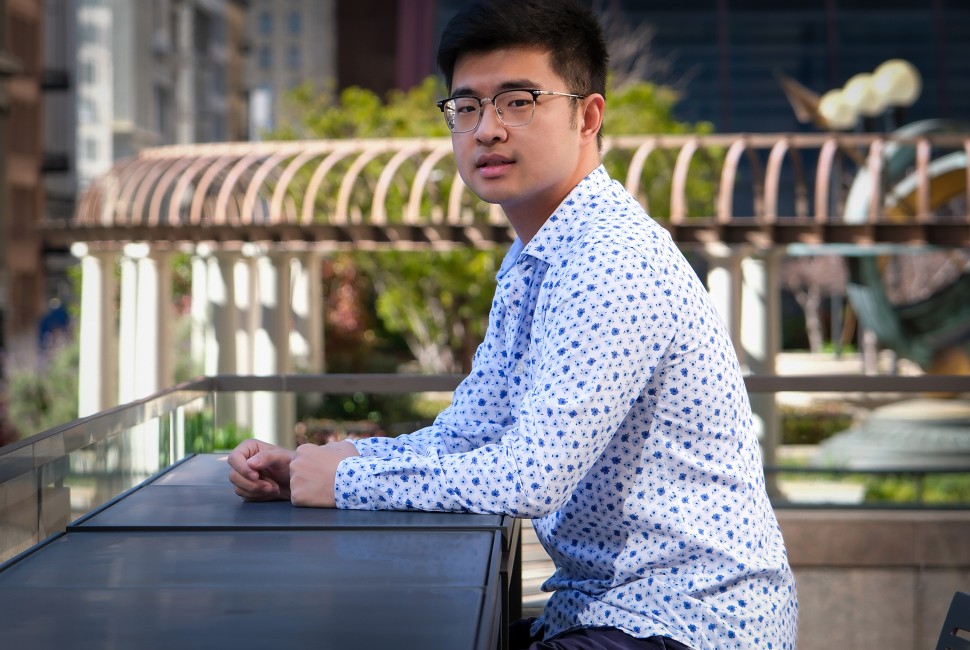Steven Jiang isn’t a fan of social media, but you wouldn’t know it by his follower counts. With over 320,000 followers on TikTok and 28,000 on Instagram, the Weinberg College of Arts and Sciences junior is nearing Internet fame — using his platform to talk about classical music and his clarinet.
The young entrepreneur and economics major, who is running two startups on the side, said his short-lived career as a professionally trained musician taught him how to tackle his natural tendency toward introversion.
“It’s funny that what I’m doing right now so heavily revolves around social media, but I think it comes down to business,” Jiang said. “I did the same thing with performing and putting myself in front of the public: It was never my favorite thing, but it’s required and important work to do.”
According to Jiang, there’s a deep knowledge gap for most musicians when it comes to business and marketing, and he thinks he can help change that through social media and his startups — currently a consulting firm for musicians looking for scholarships and a videogame company that focuses on beginner musicians.
“A lot of people can play and perform well, but they often don’t understand the business side of music — and you must understand both to be successful in music,” Jiang said. “I haven’t seen a lot of people who are musicians and entrepreneurs who are doing startups within music. I believed this was more important work than me becoming a performer.”
“I haven’t seen a lot of people who are musicians and entrepreneurs who are doing startups within music. I believed this was more important work than me becoming a performer.”
– Steven Jiang
Jiang comes from a professionally trained background that brought him from his hometown of Harbin, China, to an arts school in California for his junior and senior years of high school. Practice was rigorous, at times amounting to six or seven hours a day. He credits this background to his success as a budding entrepreneur and influencer.
“I’m seeing more and more how music has helped me in business,” Jiang said. “All the practice sessions, all the times you’re going over something … That time set a solid foundation to start a startup because it’s a lot of grit, hard work and long hours. I faced a lot of setbacks and challenges, which set me up well because with entrepreneurship you’re dealing with a lot of rejection and a lot of failures and a lot of pivoting and uncertainty on a weekly basis.”
Jiang shifted from music to business freshman year, majoring in economics and minoring in business institutions and entrepreneurship. Not wanting to abandon music altogether, Jiang made his entrepreneurial home within the niche of music.
Jiang also took up a minor in the Farley Center for Entrepreneurship and Innovation. Classes through Farley felt uniquely practical and applicable to his everyday life, which is why places like Farley and The Garage quickly became Jiang’s favorite spots on campus.
Farley has also allowed Jiang to flex some of his innovator muscles by sending him to San Francisco for a quarter-long immersion into the entrepreneurship scene of the Bay Area. On the program’s first iteration in winter of 2023, Jiang and 17 Farley classmates have had the opportunity to network, build pitch decks and prepare for pitches in classes and learn from lecturers working in the field (many of whom are Northwestern alums).
Jiang’s memories of innovating date back to his early school days in China where, as a third-grader, he drew Pokémon characters and sold them to his friends. Jiang said he even had “employees” distributing the drawings to other classrooms before his venture was shut down by a teacher.
While Jiang’s ventures today are more “legitimate,” they incorporate fun, too. His latest startup, Overture Games, which he co-founded with Weinberg senior Aspen Buckingham, gamifies music practice for beginner musicians. He describes Overture as “Duolingo meets Guitar Hero.” The videogame allows musicians to move through levels by practicing, in turn, incentivizing the musicians to practice more to improve at the game.
“And vice versa, if you play the game and come back to the instrument, it’s way easier,” Jiang said. “We’re creating an interesting process by letting them play a simple game, which is why this works and is undervalued right now.”
He also said the game can mitigate stressors that “impact every musician” like practice burnout. For Jiang, the game is about getting back to what he loves most — playing his instrument.
Jiang hopes to balance being a founder/entrepreneur and an influencer. As an influencer, he hopes to make an impact on his generation and younger kids interested in playing instruments.
“I want to make classical music more approachable to the general audience,” Jiang said. “Band kids are usually the nerdy kids who aren’t appreciated. I want to be the person who’s like, ‘hey, I play the clarinet, and I can build a following.’ I’m being their support.”


